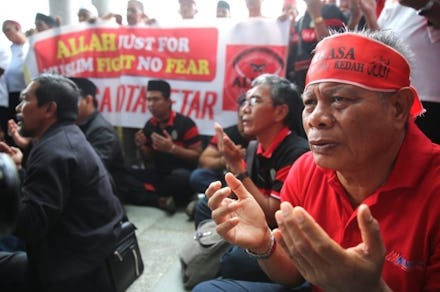Malaysian Court Rules Against "God," Infuriating the Nation's Christians

Last Monday, a Malaysian Court of Appeals ruling banned the word “Allah” from use in a Catholic newspaper, the latest development in a case ongoing since 2007. Widespread outrage from Western media sees the case as an offense against freedom of speech. But Prime Minster Najib Razak’s first public comment on the case, a clarification that the ban doesn’t apply in East Malaysia, suggests what’s really at stake for indignant Malaysians: the growing prioritization of religion over other markers of identity.
For many Malaysians, the ruling was a gesture of contempt for the indigenous peoples of Sarawak and Sabah, who make up two-thirds of Malaysia’s Christian community. While most Christians on Peninsular Malaysia worship in English or Chinese, Sarawak and Sabah Christians worship in Bahasa Malay, which uses the contended term as a general word for "God," not necessarily as a reference to the Muslim deity specifically
Sarawak and Sabah have long perplexed Malaysian politicians. State dogma requires privileging the bumiputra, or “natives,” over Chinese-Malaysian or Indian-Malaysian communities, as realized in affirmative action policies and quotas applied to everything from education to housing. On Peninsular Malaysia, bumiputra are by definition Malay-Muslim, and generally, support for Islamist policies aligns with bumiputra favoritism.
Yet the literal translation of bumiputra — “sons of the soil” — justifies preferential treatment through indigenousness rather than religion or race. The native peoples of Sabah and Sarawak are two of the three ethno-cultural groups designated for special state protection. In other words, they are bumiputra but not Muslim, something that complicates the Malaysian government's tendency to conflate bumiputra interests with Islamic ones.
Religious issues have caused friction in East Malaysia before. In 2003, a brief ban on the Iban-language bible was justified for similar reasons to the “Allah” ban. Technological error has put Sabah Christians under shariah law. More ominously, in past years there have been accusations that local politicians have allowed floods of Muslim Filipinos citizenship, “making them Malay” based on their religion and undermining Sabah’s authority over immigration.
The “Allah” issue has caused a great deal of controversy already. On the internet, East Malaysians rushed to decry the ruling. When the judges in the case justified their decision by claiming there was no historical basis for Christians using the word "Allah," several leaders stepped up to contradict this judgment. Sabah Council of Churches President Bishop Datuk Thomas Tsen spoke to the use of Allah in Christian worship “even before the idea of Malaysia was conceived.” Jeffrey Kitigan, State Reform Party chairperson, comments that “the use of 'Allah' in the Borneo states, or even in neighbouring countries, pre-date the formation of the Federation of Malaya and the Federation of Malaysia.”
Tsen and Kitigan defend their cultures by affirming their existence prior to the existence Malaysia. A historical narrative that separates “Malaya” (the states of Peninsular Malaysia) from the nation as a whole carries a whiff of sedition, though. Such histories highlight the contradictions of present-day Malaysia, a nation whose exclusion of Singapore and inclusion of East Malaysia defies any intuitive geographical order. Whoever doesn't like the ruling should leave, petulantly declares the president of Ikatan Muslimin Malaysia, Abdullah Zaik Abd Rahman. But the powers that be in Kuala Lumpur, a city raised by the oil and natural gas wealth of Sabah and Sarawak, probably don’t want those two states to secede. Instead, they would like for Sabah and Sarawak to calm down and stay down, despite the fact that when Sabah and Sarawak joined with the Malaya Federation in 1963 to form Malaysia, they were promised a large degree of cultural and administrative autonomy.
The country's ruling party, Barisan Nasional, has of late tried to strengthen its Islamic credentials, emphasizing its drive to curb “moral decadence” and enforce shariah principles But it may have finally gone too far. Even the opposition PAS Party, or the Pan-Malaysian Islamic Party, says “Allah” is acceptable for Christians to use. Sarawak and Sabah are traditionally Barisan Nasional strongholds, and to lose ground there could be disastrous. Prime Minister Najib may hope his clarification of the ban’s limits will appease unhappy East Malaysians. But while the ban may not tangibly affect them, the judge’s language — cancelling out the historical experience of East Malaysians –— will rankle.
There are clear incentives for Barisan Nasional to attempt to curry favor with Malaysia's Muslims, and with the Islamic world in general. More critically for local politicians, evaluating political and social concerns based on religion alone would be an easy way to avoid sorting through the threads of ethnicity, history, culture, and language that form the heart of Malaysian identity.
The “Allah” ruling sets the two major forces in Malaysian politics — conservative Islamism and bumiputra nationalism — at odds with each other. It’s less a collision than a rupture, and the bleeding is internal. Politicians seeking to craft a coherent Malaysia have often fooled themselves that there can be a total reconciliation between the two. This fantasy has collapsed, but the fury provoked by a seeming affront to Sabah and Sarawak has shown many Malaysians' resolve to embrace rather than ignore their nation’s contradictions.